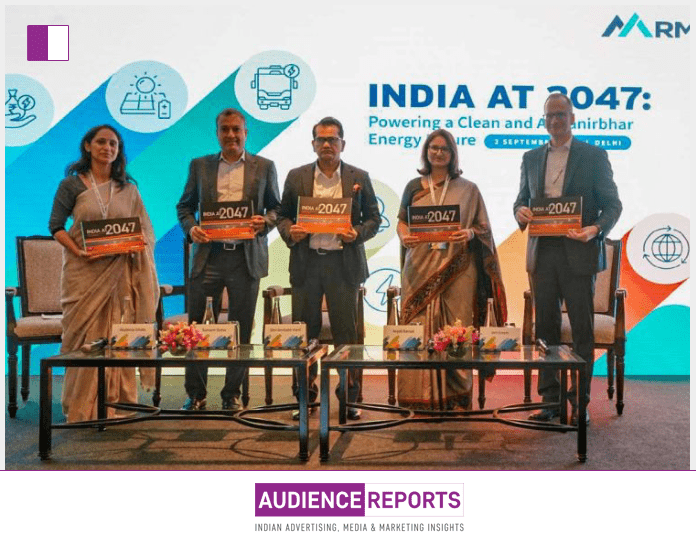Akshima Ghate, Managing Director of RMI India, is at the forefront of India’s journey towards energy independence, particularly in the mobility sector. With her visionary leadership and dedication, Akshima Ghate has played a pivotal role in shaping strategies that not only aim to transform transportation in India but also make it more sustainable and self-reliant. Recently, Akshima Ghate shared the launch of RMI’s latest report, India at 2047: A Vision for Energy Independence in the Mobility Sector, a comprehensive roadmap for achieving energy independence through clean mobility solutions.
Akshima Ghate’s post highlights the importance of aligning this report with the Government of India’s goal for energy independence by 2047. The report serves as a blueprint for transitioning India’s road transport sector towards the adoption of clean fuel vehicles, thus enabling the country to reduce its dependence on crude oil and gas imports while significantly lowering carbon emissions. Akshima Ghate believes that this transformation is not only necessary but achievable, and her efforts with RMI India aim to accelerate the implementation of actionable strategies that will shape the future of mobility in the country.
A central theme of Akshima Ghate’s leadership is her focus on actionable solutions. The report emphasizes three key takeaways that, according to Akshima Ghate, are critical for India to achieve energy independence in the mobility sector. The first and perhaps most important is the electrification of trucks. Akshima Ghate stresses the need for India to reach 100% clean fuel vehicle adoption across all segments by 2043, with a particular focus on achieving 100% zero-emission truck (ZET) adoption by 2043. This shift, as detailed by Akshima Ghate, is projected to reduce India’s crude oil and gas requirements by 91% and 58%, respectively, by 2047, marking a significant milestone in the nation’s journey toward energy independence.
In addition to electrifying trucks, Akshima Ghate highlights the importance of building a circular battery economy. With the rise in electric vehicle (EV) adoption, India’s demand for lithium-ion batteries (LiBs) is expected to increase exponentially. Akshima Ghate notes that by 2047, the country’s demand for these batteries will surge by an astonishing 89-fold, reaching 1,067 GWh. However, Akshima Ghate is optimistic that by 2030, recycled EV LiBs could supply between 5% and 20% of India’s domestic needs for critical minerals like lithium, nickel, and cobalt. This, she explains, would not only reduce the country’s dependence on imports but also establish a sustainable and circular battery supply chain, further strengthening India’s energy independence.
Akshima Ghate’s commitment to clean energy extends beyond mobility. She understands that the rise in electric vehicles will lead to a significant increase in electricity demand, which must be met with sustainable energy sources. According to Akshima Ghate, the report outlines the need for India to invest in 500 GW of renewable energy by 2030 and transition to an 85% clean energy grid by 2047. These efforts, she explains, are essential for powering future mobility in India with renewable energy, ensuring that the country’s shift towards clean fuel vehicles is supported by a sustainable energy infrastructure.
Akshima Ghate’s leadership in RMI India has brought together key stakeholders, industry leaders, and policymakers to discuss the future of India’s mobility sector. At the launch of the India at 2047 report, Akshima Ghate expressed her gratitude to Amitabh Kant for delivering an inspiring keynote address that set the tone for the event. She also acknowledged the contributions of other prominent figures, including Sumant Sinha, Anjali Bansal, and Jon Creyts, who emphasized the urgency of transitioning to clean fuel vehicles and highlighted the importance of collaboration in achieving energy independence.
Through her work, Akshima Ghate has demonstrated a deep understanding of the complex challenges and opportunities that lie ahead for India’s mobility sector. She recognizes that achieving energy independence will require not only technological advancements but also a collective effort from industry leaders, policymakers, and citizens. Akshima Ghate is committed to leading this charge by advocating for policies that support the widespread adoption of clean fuel vehicles, investments in renewable energy, and the development of a circular economy.
What sets Akshima Ghate apart as a leader is her ability to translate ambitious goals into concrete actions. She is not content with simply outlining a vision for the future—she is actively working to make that vision a reality. Under her leadership, RMI India is spearheading efforts to transform India’s road transport sector, not just through reports and recommendations but by driving real change on the ground. Akshima Ghate’s approach is grounded in the belief that progress in the mobility sector can have a far-reaching impact, not only on energy independence but also on economic growth, environmental sustainability, and social equity.
As India looks toward its goal of energy independence by 2047, Akshima Ghate’s work with RMI India will undoubtedly play a crucial role in shaping the country’s path forward. Her dedication to clean mobility, renewable energy, and a circular economy reflects a broader commitment to creating a sustainable and prosperous future for India. Akshima Ghate’s leadership serves as an inspiration to those who share her vision for a cleaner, greener, and more self-reliant nation.
Akshima Ghate is a driving force behind India’s push for energy independence in the mobility sector. Her work with RMI India and the launch of the India at 2047 report underscore her commitment to creating a sustainable future through the adoption of clean fuel vehicles, the development of a circular battery economy, and investments in renewable energy. Akshima Ghate’s leadership and vision are paving the way for a more sustainable and energy-independent India, and her efforts will undoubtedly have a lasting impact on the country’s mobility sector and beyond.



































